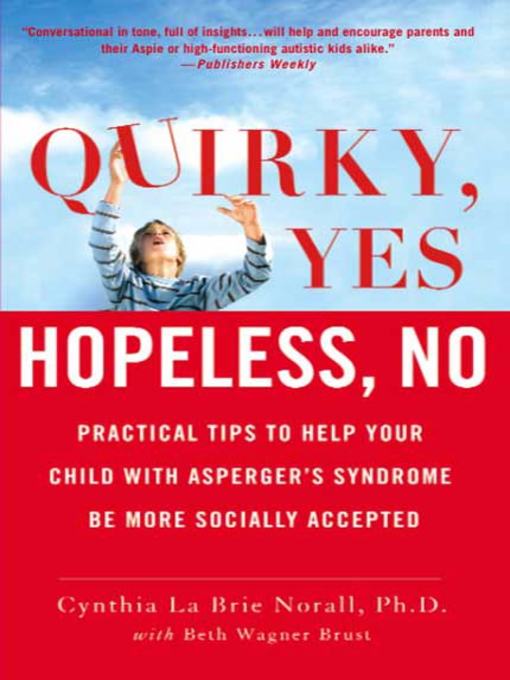
Quirky, Yes—-Hopeless, No
Practical Tips to Help Your Child with Asperger's Syndrome Be More Socially Accepted
کتاب های مرتبط
- اطلاعات
- نقد و بررسی
- دیدگاه کاربران
نقد و بررسی

May 18, 2009
In 2000, educational psychologist Norwall created the Friends’ Club, a nonjudgmental, stress-free environment where kids with Asperger’s syndrome could learn to communicate effectively, make friends and succeed in social settings. Certain aspects of social awareness—greeting others, asking questions, listening without interruption and looking someone in the eye and smiling—do not come naturally to Asperger’s kids, but with guidance, coaching and practice, children can conquer these essential people skills and no longer unintentionally get into trouble because others misunderstand their words or actions. This book, based on Norwall’s outreach work, is designed to be a handy, practical guide. Beginning with two chapters of bulleted info and FAQs to explain and identify the signs and symptoms of the condition, it presents 85 Lessons for Decoding Asperger’s Children, arranged alphabetically from acceptance, anger and annoying behavior through peer pressure, and even “Telling Your Child He Has Asperger’s.” Each useful, carefully worded entry addresses kids’ behaviors and their parents’ concerns, gives examples from real situations and offers suggestions for change or, as is often the case, acceptance. Although a dozen or more experts are cited, the book is conversational in tone, full of insights and will help and encourage parents and their Aspie or high-functioning autistic kids alike.

June 15, 2009
Picking up on the description used by Perri Klass and Eileen Costello in "Quirky Kids: Understanding and Helping Your Child Who Doesn't Fit In", licensed educational psychologist Norall and children's-book author Brust utilize an easy-to-follow alphabetical format to present 85 issues facing children and teenagers with Asperger's syndrome. Topics cover wide ground, from dealing with anger and frustration to birthday parties to phone skills to white lies. Also addressed are the crucial issues of bullying and cyberbullying. The book contains a useful sample letter for parents to send to teachers at the beginning of the school year, a glossary of terms, further information about bullying, and lists of recommended reading, Internet sites, and games. VERDICT Norall and Brust offer much-needed practical advice in a readable style, although many parents would disagree with blanket statements such as, "Asperger's kids also have no curiosity about other people." As the authors point out, parents now have access to a variety of essential resources and supports; this book is one.Beth Safford, Nevins Memorial Lib., Methuen, MA
Copyright 2009 Library Journal, LLC Used with permission.

























دیدگاه کاربران